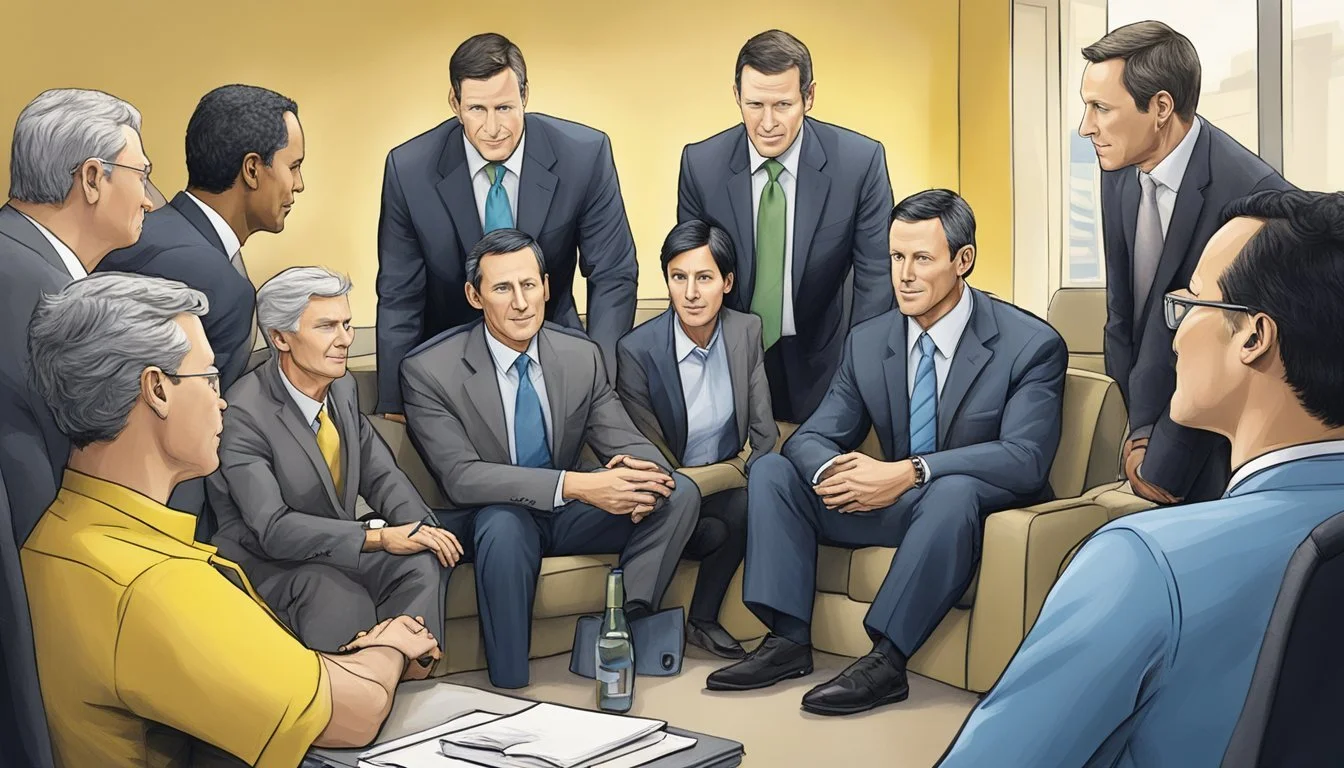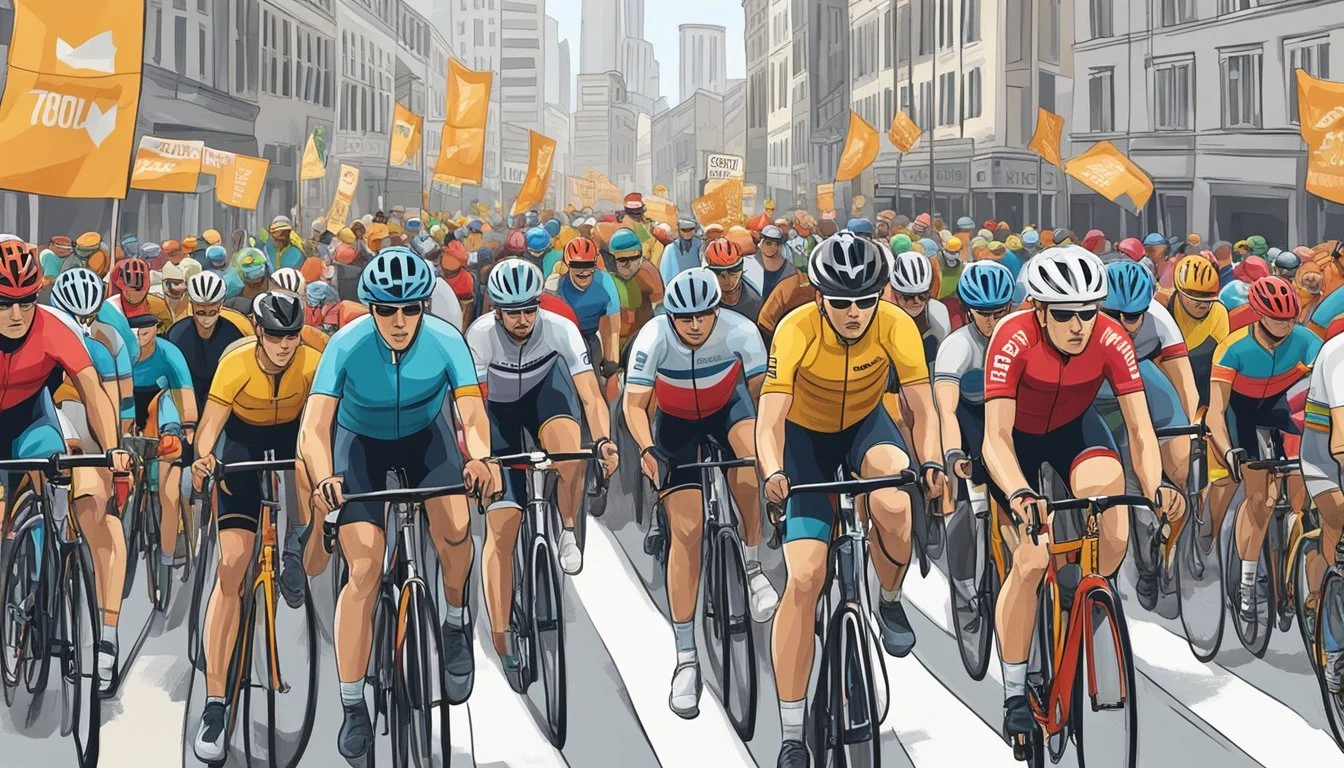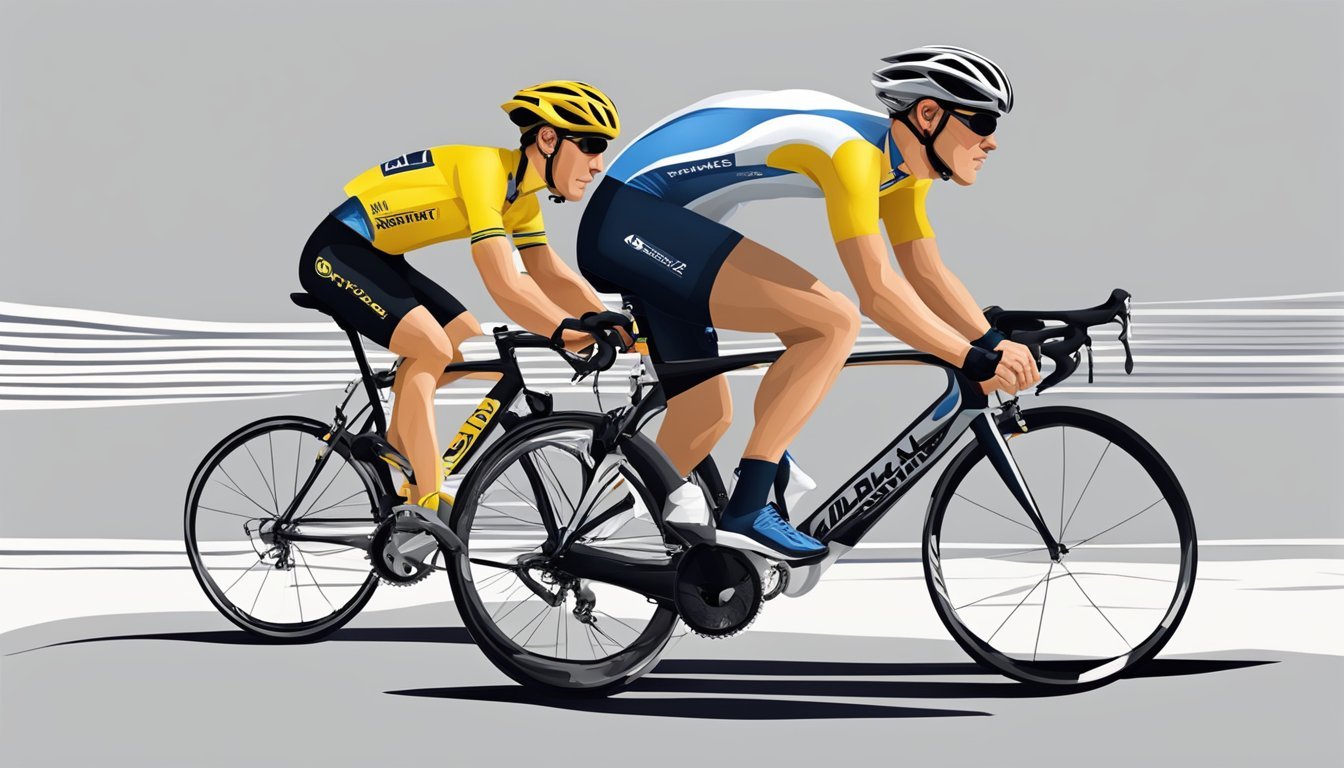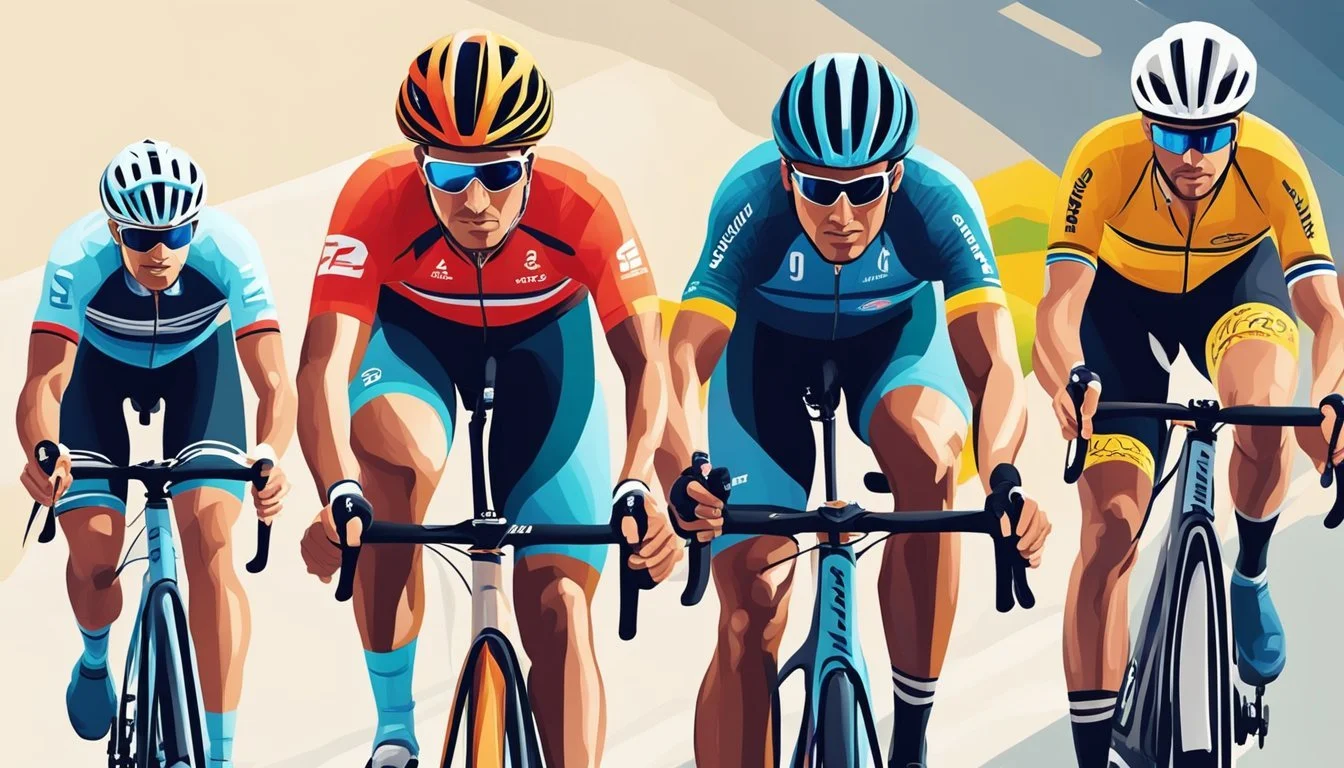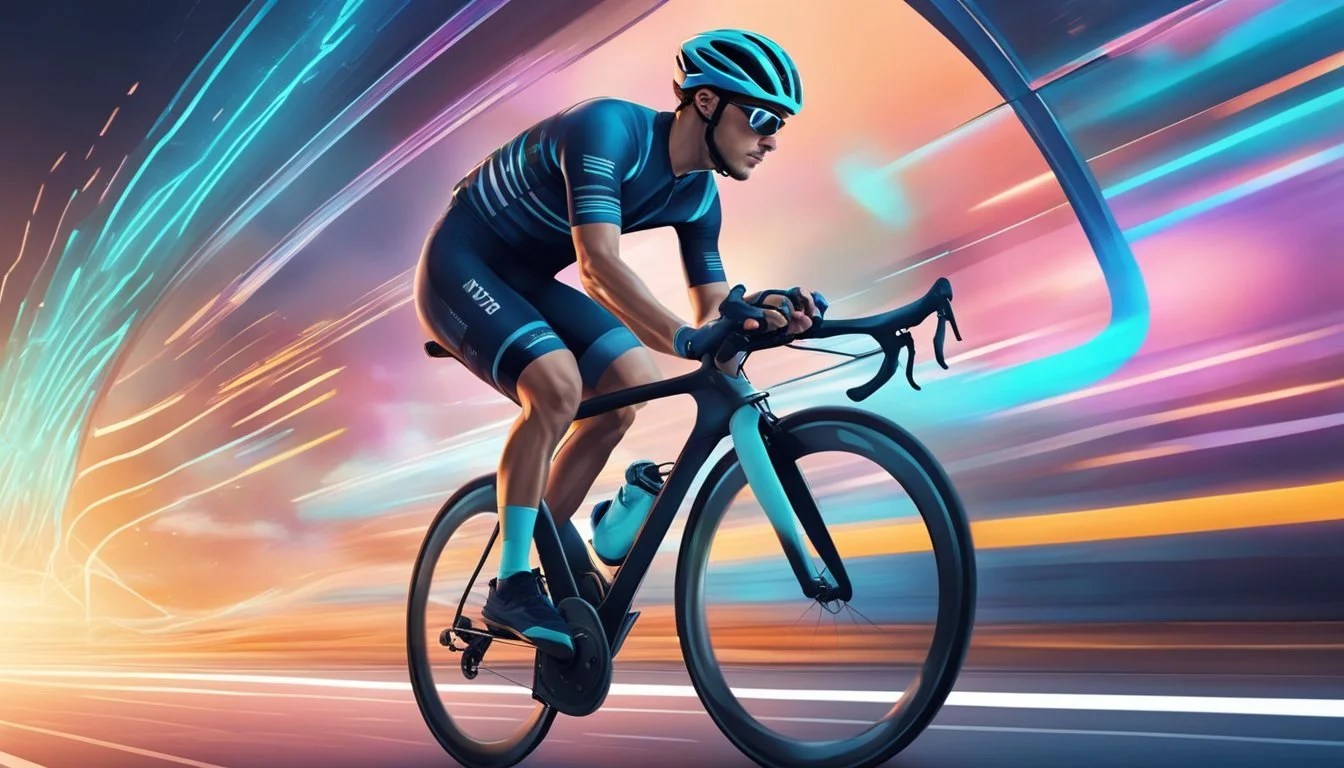Lance Armstrong Hosts The Forward Podcast
Cycling Podcast Explores Controversial Career
Lance Armstrong's podcast "The Forward" offers listeners a unique window into conversations with diverse and fascinating personalities. The show features guests from various fields including politics, entertainment, sports, science, and business. Armstrong engages in revealing discussions that provide rare insights into the lives and thoughts of both well-known figures and individuals with compelling stories to share.
Notable guests on "The Forward" have included Malcolm Gladwell, Neil deGrasse Tyson, and Chris Evert. These conversations often explore intriguing topics and delve into the experiences that have shaped the guests' perspectives and achievements. The podcast's format allows for in-depth exchanges that go beyond surface-level interviews.
"The Forward" is available on multiple platforms including YouTube, Apple Podcasts, and iHeart. This accessibility ensures that listeners can easily tune in to hear Armstrong's latest conversations with his eclectic range of guests. The show continues to attract audiences interested in hearing authentic dialogues with influential and interesting personalities.
Lance Armstrong's Cycling Career
Lance Armstrong's cycling career was marked by extraordinary success and devastating controversy. His journey from promising young talent to multi-time Tour de France champion captivated the sports world before a doping scandal tarnished his legacy.
Rise to Prominence in Sports
Armstrong began his professional cycling career in 1992, finishing last in his debut race in San Sebastian, Spain. He quickly improved, winning the World Championship in 1993 at the age of 21.
In 1996, Armstrong was diagnosed with testicular cancer that had spread to his brain and lungs. After successful treatment, he returned to cycling in 1998, shocking many with his resilience.
Victories at the Tour de France
From 1999 to 2005, Armstrong dominated the Tour de France, winning an unprecedented seven consecutive titles. His performances were characterized by powerful climbing, strong time trials, and tactical prowess.
Armstrong's success brought increased attention to cycling in the United States. He became an inspiration to many, particularly cancer survivors, through his Livestrong Foundation.
The Downfall and Doping Scandal
In 2012, the United States Anti-Doping Agency (USADA) accused Armstrong of using performance-enhancing drugs throughout his career. He was stripped of his Tour de France titles and banned from competitive cycling for life.
Armstrong initially denied the allegations but later admitted to doping in a 2013 interview with Oprah Winfrey. This confession shocked fans and dramatically altered public perception of his achievements.
Women's Tour de France and Inga Thompson
While Armstrong's career focused on men's cycling, the women's Tour de France faced its own challenges. Inga Thompson, a prominent American cyclist, competed in the women's Tour in the 1980s.
Thompson won three stages in the women's Tour de France and advocated for gender equality in cycling. Her efforts helped pave the way for increased recognition of women's professional cycling.
Notable Contemporaries in Cycling
During Armstrong's era, several cyclists emerged as fierce competitors:
Jan Ullrich: German cyclist who won the 1997 Tour de France and finished second to Armstrong multiple times.
Sir Bradley Wiggins: British cyclist who won the 2012 Tour de France and multiple Olympic gold medals.
These riders, along with Armstrong, defined a generation of cycling, each leaving their mark on the sport in unique ways.
Overcoming Personal Challenges
Lance Armstrong's journey has been marked by significant personal challenges that tested his resolve and character. His experiences with addiction, pursuit of redemption, and cultivation of mental fortitude shaped his path both on and off the bike.
Battling with Addiction
Armstrong's struggle with addiction began in his youth. He turned to performance-enhancing drugs to gain a competitive edge in cycling. This decision led to a spiral of deception and cover-ups that lasted for years.
The pressure to maintain his success and public image fueled his continued substance use. Armstrong's addiction extended beyond drugs to include the thrill of winning and public adoration.
As scrutiny increased, Armstrong faced the difficult task of confronting his addiction. He had to acknowledge the harm it caused to his career, relationships, and integrity.
The Path to Redemption
After admitting to doping, Armstrong embarked on a challenging journey towards redemption. He faced legal battles, financial penalties, and the stripping of his Tour de France titles.
Armstrong worked to rebuild trust with the public and cycling community. He engaged in candid interviews, expressing remorse for his actions and the impact on others.
His efforts included supporting cancer research and advocacy through the Livestrong Foundation, though he stepped down from its leadership to protect the organization's reputation.
Resilience and Mental Fortitude
Armstrong's ability to persevere through adversity demonstrates his mental toughness. He overcame cancer early in his career, returning to cycling stronger than before.
This resilience was further tested when facing the consequences of his doping scandal. Armstrong had to rebuild his life and find purpose beyond professional cycling.
He channeled his competitive spirit into new ventures, including podcasting and endurance events. Armstrong's mental fortitude allowed him to adapt to life after professional sports and scandal.
Entrepreneurship and Business Ventures
Lance Armstrong has expanded his influence beyond cycling into various entrepreneurial pursuits and philanthropic initiatives. His ventures span wellness, community development, and sustainable food systems.
Investments in Wellness and Longevity
Armstrong's investment portfolio reflects a strong focus on health and longevity. He partnered with Dr. Peter Attia, a prominent longevity expert, to explore cutting-edge wellness technologies. Their collaboration aims to advance research in areas like preventive medicine and personalized health solutions.
Next Ventures, Armstrong's venture capital firm, raised $24.5 million in its initial funding round. The company targets investments in sports, fitness, and wellness startups. This strategic move allows Armstrong to leverage his athletic background and network to support innovative health-focused businesses.
The Kitchen and Community Initiatives
Armstrong's commitment to community development is evident through his involvement with The Kitchen, a family of restaurants co-founded by Kimbal Musk. This project promotes the "community through food" concept, emphasizing locally-sourced ingredients and sustainable practices.
The Kitchen Community, a nonprofit extension of the restaurant group, installs Learning Gardens in schools. These gardens serve as outdoor classrooms, teaching students about nutrition and environmental stewardship. Armstrong's support for these initiatives demonstrates his dedication to fostering healthier communities through education and access to fresh food.
Connection to Tesla and Kimbal Musk
Armstrong's business network includes connections to Tesla and its board member, Kimbal Musk. This relationship bridges Armstrong's interests in sustainable technology and community-focused enterprises.
Kimbal Musk's work with The Kitchen aligns closely with Armstrong's vision for community improvement. Their shared interest in sustainable food systems and technology-driven solutions has led to collaborative efforts in promoting healthier lifestyles.
Armstrong's association with these influential figures in the tech and sustainability sectors positions him at the intersection of innovation and social impact. This connection enhances his ability to drive change in both the business and philanthropic realms.
Advocacy and Sociopolitical Issues
Lance Armstrong's podcast "The Forward" touches on various social and political topics. The show explores nonprofit initiatives, health and wellness, media polarization, and LGBTQI+ equality through conversations with diverse guests.
Involvement in Nonprofit Initiatives
Armstrong uses his platform to highlight nonprofit organizations making a difference. He interviews leaders from various charities, discussing their missions and impact. The podcast has featured conversations about cancer research foundations, environmental conservation groups, and educational initiatives.
Armstrong often shares personal experiences with nonprofit work, drawing from his time with the Livestrong Foundation. He explores innovative fundraising strategies and volunteer engagement techniques with his guests.
The show also examines challenges faced by nonprofits, such as resource allocation and public awareness. Armstrong's discussions offer listeners insights into the inner workings of these organizations and ways to support their causes.
Contribution to Health and Wellness
"The Forward" regularly addresses health and wellness topics. Armstrong interviews medical professionals, researchers, and health advocates to discuss advancements in disease prevention and treatment.
The podcast has covered emerging technologies in health risk detection, exploring early diagnosis methods for various conditions. Armstrong's personal experience with cancer often informs these conversations, providing a unique perspective on patient care and recovery.
Mental health is another focus area, with episodes dedicated to discussing psychedelic-assisted therapy for PTSD and other mental health conditions. Armstrong explores the potential benefits and controversies surrounding these treatment approaches.
Media Polarization and U.S. Leadership
Armstrong delves into the complex issue of media polarization on his podcast. He invites journalists, political analysts, and media experts to discuss the impact of divisive reporting on U.S. society and politics.
The show examines how media fragmentation affects public discourse and decision-making. Guests share insights on navigating the current media landscape and identifying reliable information sources.
Armstrong also explores the challenges facing U.S. leadership in a polarized environment. Discussions touch on bipartisanship, effective governance, and rebuilding trust in institutions.
Support for Lesbian, Gay, Bisexual, Transgender, Questioning, Intersex & Plus (LGBTQI+) Equality
"The Forward" demonstrates strong support for LGBTQI+ equality. Armstrong interviews activists, athletes, and public figures who advocate for LGBTQI+ rights and inclusion.
The podcast has featured conversations with Anne Lieberman from Athlete Ally, discussing efforts to promote LGBTQI+ acceptance in sports. These episodes highlight challenges faced by LGBTQI+ athletes and initiatives to create more inclusive sporting environments.
Armstrong explores the intersection of LGBTQI+ rights with other social justice movements. The show addresses topics such as workplace discrimination, healthcare access, and legal protections for LGBTQI+ individuals.
Cultural Impact and Public Perception
Lance Armstrong's influence extends far beyond cycling. His story has permeated popular culture, shaped media narratives, and sparked debates about redemption in sports.
Influence on Popular Culture
Armstrong's rise and fall impacted music, fashion, and lifestyle trends. Country music star Chris Stapleton referenced Armstrong in lyrics, highlighting the cyclist's cultural relevance. Nathaniel Rateliff's hit "S.O.B." alluded to overcoming personal struggles, resonating with Armstrong's narrative.
The LIVESTRONG bracelets became a global phenomenon, raising awareness for cancer research. This simple accessory transcended cycling, becoming a symbol of hope and perseverance.
Armstrong's story influenced fitness culture, inspiring many to take up cycling. Bike sales surged, and cycling events gained popularity across America.
Depiction in Media and Literature
Numerous books, documentaries, and films have chronicled Armstrong's journey. Historian Douglas Brinkley's work explored Armstrong's impact on American sports culture.
Media coverage evolved from heroic portrayals to critical examinations. Documentaries like "The Armstrong Lie" delved into the complexities of his career.
Armstrong's story became a cautionary tale in sports ethics discussions. It sparked debates about doping, hero worship, and the pressure to succeed in professional sports.
Public Image and Redemption Narrative
Armstrong's public image underwent dramatic shifts. Initially hailed as a hero, he faced intense backlash after admitting to doping.
His attempts at redemption have been met with mixed reactions. Some view his efforts as genuine, while others remain skeptical.
Media polarization has affected public perception. Conservative and liberal outlets often frame Armstrong's story differently, reflecting broader political divides.
Armstrong's podcast "The Forward" serves as a platform for his redemption efforts. It allows him to engage with public figures and reshape his narrative.
Election cycles have occasionally drawn parallels to Armstrong's story, with candidates discussing themes of comeback and personal growth.
Collaborations and Relationships
Lance Armstrong's network spans influential figures, athletes, and business partners. His podcast "The Forward" has facilitated connections across various fields, while his sports background has led to unique partnerships.
Friendships with Influential Figures
Armstrong's friendships extend beyond the cycling world. He has developed relationships with notable personalities through his podcast. Michael Chernow, founder of The Meatball Shop and Seamore's restaurants, has been a guest, discussing entrepreneurship and healthy living.
Ken Rideout, a fellow over-50 runner, has connected with Armstrong through their shared passion for endurance sports. Their conversations often touch on the challenges and rewards of athletic pursuits later in life.
Billy Walters, a prominent sports bettor, has also been featured on "The Forward." Their discussions have covered the intricacies of sports betting and Walters' experiences in the industry.
Partnerships in Sports and Business
Armstrong's involvement in sports has evolved into business partnerships. He has collaborated with other athletes to promote fitness and wellness initiatives. His interest in boxing has led to connections within that community, potentially opening doors for future ventures.
In the business realm, Armstrong has leveraged his cycling experience and network. He has partnered with companies developing innovative sports technology and equipment. These collaborations often focus on enhancing performance for athletes across various disciplines.
Armstrong's podcast has also become a platform for exploring potential business partnerships. It allows him to connect with entrepreneurs and industry leaders, potentially leading to new ventures or investments.
Contemporary Issues in Sports
Sports face complex challenges around fairness, technology, and inclusivity. Debates on these topics shape policies and public discourse in athletics today.
Debates Around Performance Enhancing Drugs
Performance enhancing drugs remain controversial in sports. Some argue they provide unfair advantages, while others claim they aid recovery. Detection methods continue to evolve as new substances emerge.
High-profile doping scandals have damaged public trust in certain sports. Cycling faced scrutiny after Lance Armstrong's admission of doping. Track and field saw cases like Caster Semenya's, raising questions about naturally occurring hormone levels.
Policies vary between sports and governing bodies. Some advocate for relaxed rules, while others push for stricter testing and harsher penalties.
The Role of Data in Modern Athletics
Data analytics now play a crucial role in sports performance and strategy. Teams use advanced statistics to gain competitive edges. Wearable technology tracks athlete biometrics in real-time.
Sports science labs conduct biomechanical analyses to optimize techniques. Computer simulations help refine tactics and game plans.
Concerns exist about data privacy and the human element of sports being diminished. Critics worry overreliance on analytics could reduce spontaneity and intuition in competition.
Addressing Inequality and Fairness
Transgender athlete participation sparks heated debates. Some cite biological differences, while others emphasize inclusivity. Scientist Carole Hooven argues testosterone provides physical advantages.
Policies differ across sports organizations. Some require hormone level testing or waiting periods after transitioning. Others allow athletes to compete based on gender identity.
Economic disparities between countries and athletes remain an issue. Access to training facilities, nutrition, and medical care varies widely. Questions of fairness arise when athletes from different backgrounds compete.
Global Influence and International Relations
Lance Armstrong's podcast "The Forward" has extended its reach beyond sports, touching on international affairs and cultural diplomacy. The show has featured guests with diverse global perspectives, contributing to cross-cultural understanding and dialogue.
Sports Diplomacy and Geopolitical Impact
"The Forward" has explored the intersection of sports and international relations through interviews with notable figures. Yaroslav Popovych, a former professional cyclist from Ukraine, shared insights on how sports can bridge political divides. The podcast discussed Ukraine's geopolitical challenges and the role of athletes as unofficial ambassadors.
Armstrong's conversations have also delved into unconventional diplomatic approaches. An interview with Rick Doblin, founder of the Multidisciplinary Association for Psychedelic Studies, examined the potential of psychedelic research in addressing global mental health issues and fostering international cooperation.
These discussions have highlighted the power of sports and alternative therapies in shaping global narratives and fostering connections across borders. "The Forward" has become a platform for exploring innovative solutions to complex international challenges.
Future of Health and Athletics
Cutting-edge technologies and research are revolutionizing health monitoring and athletic performance. These advancements promise to reshape how we approach fitness, disease prevention, and sports medicine.
Advancements in Diagnostic Tools
Wearable devices now offer real-time health data tracking, enabling athletes to optimize their training regimens. Smart fabrics embedded with sensors measure heart rate, oxygen levels, and muscle fatigue during workouts.
3D-printed custom orthotics and prosthetics are tailored to individual athletes, enhancing comfort and performance. Artificial intelligence analyzes biomechanical data to predict injury risks and suggest preventive measures.
Virtual reality simulations allow athletes to practice techniques and strategies in controlled environments. This technology aids in rehabilitation and helps athletes mentally prepare for competitions.
Pioneering Research in Early Health Risk Detection
Genetic testing identifies predispositions to certain health conditions, allowing for personalized prevention strategies. Blood biomarker analysis can detect early signs of overtraining or nutritional deficiencies in athletes.
Advanced imaging techniques reveal micro-injuries before they become serious problems. This early detection helps prevent career-threatening injuries and extends athletes' competitive lifespans.
Researchers are developing non-invasive methods to monitor brain health, crucial for contact sports. These tools may revolutionize concussion protocols and long-term neurological health management in athletics.



